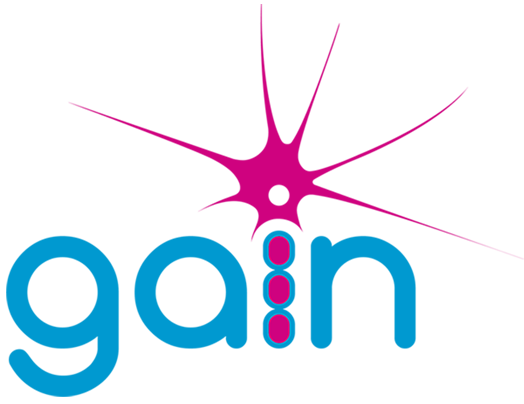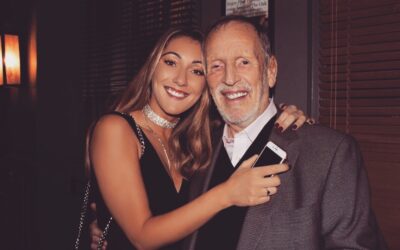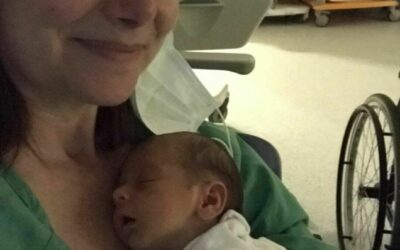As Trishna Patel recovered from a bout of flu in 2017, little did she imagine that the next few months would see her having to learn how to walk and talk again.
Trish’s GBS Story
What is Guillain-Barre syndrome? So many of us have been asked that question, right? When I tell people I was diagnosed with GBS they immediately look confused! Guillain-Barre syndrome is not a well-known illness at all and to be honest, the first time I heard those three words was when I was being told I had it.
Something’s not right
It started with a backache that I just couldn’t shift; I was aching so badly that I even left a party early – which is very unlike me! I kept asking myself ‘did I sleep funny?’, ‘move too suddenly?’ or ‘am I just aching from a gym workout?’
I woke up the next morning with sharp tingling in my hands and feet – the feeling was very different to the normal ‘pins and needles’ and so I knew something was wrong. I had caught the flu two weeks prior to this moment, but at the time did not think two could possibly relate. I called 111 and was advised to go straight into A&E.
The diagnosis
Feeling very clueless walking into the hospital, the doctor told me they would need to monitor me over the next few hours to see how bad the situation became. No big deal, I was sick, the doctor would give me medicine and I would go home and be fine. My mum even put a Sunday roast on and said dinner would be waiting for me when I returned from A&E later that afternoon. Little did we know, I’d be in hospital for the next few months.
When the doctor came back to see me in the evening, my body had become weaker and my arms and legs were starting to feel numb. I am usually very ticklish, but I couldn’t feel anything this time. From examinations, my reflexes had gone, which made the doctor think that I had GBS.
He asked me to walk in a straight line and noticed that my knees were starting to bend inwards and that my walk was off balance. I was very lucky that the neurologist who saw me on my first night immediately had an idea of what was going on and knew what tests to complete.
He printed off a GBS fact sheet and asked my family and I to read over it and think of any questions we had. Firstly, we couldn’t even pronounce “Guillain-Barre”, so uplifted ourselves by laughter over that. Secondly, we just didn’t quite understand how or why he thought my symptoms could lead to such condition. Surely, I had more chances of winning the lottery?
He began drawing a diagram which explained that would be rapid disease progression leading to potential total paralysis within the next few days. We all were left speechless. Over the next two days, removal of spinal fluid and MRI scans (brain and body) were carried out – it was these procedures that led to my official diagnosis.
Here for the long haul
The doctors were highly concerned with the capability of my lungs as I started getting shortness of breath. After a few breathing tests, the doctor thought that my diaphragm was collapsing.
At this point I still had no idea what was going on. I was rushed in an ambulance (sirens and everything) to another hospital with an ICU/HDU as they thought I was moments away from mechanical ventilation. I had never stepped foot in this type of unit before and in my mind, this place was really, really sick people – the doctors must have my records confused, I thought.
I was monitored at every single moment over the next week in ICU/HDU and within the space of seven days, not only did I need assistance walking, but the left side of my face had completely drooped. The doctor checked for stroke signs but gave me the all-clear.
After one week of Intravenous Immunoglobulin (IVIG) treatment I was moved to the heart ward of the hospital. I remember having a physio session whereby I attempted to stand up; unlike the previous day, I completely collapsed to the floor and it was in that moment that I realised I was paralysed and had no strength to lift my own body. the deterioration that the doctor warned me of on my first day admitted, was now happening to me. I constantly felt so tired, all I wanted to do was sleep, even having a shower made me feel exhausted. I had to leave all my pride aside as I now couldn’t do anything independently.
Due to the onset of facial palsy, I experienced difficulties with speech. As a result, my speech became unclear and it was harder to communicate. For a chatterbox like myself, this was really upsetting! I felt so self-conscious that at times I would refuse to look in the bathroom mirror. I just didn’t see myself looking back at me and couldn’t help but wonder if this were I would look and feel like for the rest of my life.
As the days went on, I found it more difficult to swallow and was informed that if my condition got any worse, they would put a tube down my throat – I was really not keen on this, so I opted for liquid diet.
I tried to stay as emotionally strong as possible but on many nights after my family would leave, I would cry my eyes out being physically unable to wipe the tears that streamed down my face. Every night, I kept telling myself I was in a bad dream that I would soon wake up from.
The treatment is finally working
I was administered another course of IVIG as the doctor said that the first course didn’t work due to my antibodies/ immune system fighting off the treatment as it recognised that it was ‘foreign’. This was mostly likely due to my young age; I was 25 fuming at my own body! “Oh, now you want to protect me?” I thought to myself.
The days went by so quickly in hospital – by the time the neurologist, physios, speech therapist, critical care nurses and other staff had come to review me, I would be exhausted. I felt so lucky to have so many visitors during my time in hospital – my family and friend’s support and positivity was and is a massive part of my recovery and overall journey.
On the road to rehabilitation
After a few weeks, I was finally starting to show signs of improvement, I had never felt so relieved in my life! It started with gaining sensation back in my right foot, I was ticklish again – hooray! I was determined to beat the odds; I put all my energy and effort into the exercises and activities set by the physios and occupational therapists. I continued to progress daily, setting different goals each day, stretching my arms a bit higher to the ceiling and rinsing a washcloth with more strength than yesterday. The doctors were happy for me o be transferred to the rehabilitation ward and from there, I worked even more closely with the neurophysios who helped me to take my first steps again.
The feeling was like no other, I cried with joy as my feet finally lifted off the floor and my arms began to swing. The movement was slow and definitely not smooth, but I felt as though I was prancing my way through the ward corridors. The physios continued to challenge me by including gym equipment and the dreaded stairs into my workouts. I began to pick up my walking pace and over time, I knew that my brain and body were starting to connect again – I felt so proud!
The unknown is an unsettling place
“How long will my full recovery take?”, “Will my facial palsy ever recover?” “When do the pins and needles stop”. I still had so many questions for my neurologist on his regular visits. He would continue to tell me how the journey is slow and that over time, I would continue to improve but he couldn’t give me an exact date. This took me a while to accept. The unknown is an unsettling place and for someone like myself who is very organised and likes to have control over what I can, I really struggled to accept this.
A new way of life…
My family and friends all made bets on my discharge date, it was like a fun game I’d get everyone to play when they visited me, the winner getting a good old pat on the back! I was finally discharged from hospital when my breathing results were considered normal and when I was able to walk alone. I knew that my lifestyle would look very different to how I once left it. I went back and forth with my my emotions in accepting this change. I spent every week visiting the physio clinic as well as every 3 months visiting the neurologist.
Within 12 months of exercising regularly, sleeping and eating well, I was able to run and feel light on my feet again. At present, my facial palsy remains slightly – many say they can’t notice it, but I think it’s a personal barrier for me to still overcome. Only after 3 years has my tingles in my hands and feet disappeared. i work out twice a week with my personal trainer and am now lifting heavier weights than I ever could pre-GBS. I still do have down days – which we are allowed to have, but I have accepted that this journey is tough but by no means will it defeat me!
My advice for anyone going through this is to remain patient and willing. Healing is not an overnight process – this is something I remind myself of daily and even when you feel discouraged, remind yourself of how far you have already come. One of my favourite affirmations which I can say regularly is “Every day in every way, I am getting better and better”.
Thank you for reading my story.
Love Trish x



